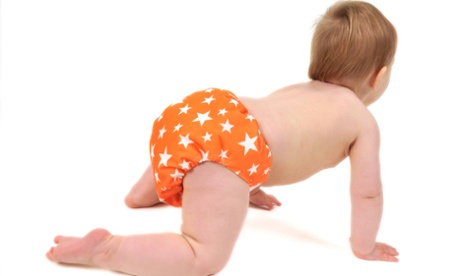
“I appreciate your evidence-based approach.” I said recently, in a heated discussion about washing nappies, “But while the NHS recommends using non-bio detergents on baby clothes, you aren’t likely to convince the whole country to change its view.” “Yeah,” said a colleague, “getting the NHS to change their views on anything is like trying to get a baby to sleep on demand.”
“Change has to start somewhere,” replied our conversation partner.
I run a citizen science project for parents who use reusable nappies. Our aim is to question received wisdom on the topic and look for actual evidence. Believe it or not, there are a lot of persistent myths about the best way to wash cloth nappies. And a lot of contradictory advice.
One thing that almost everyone agrees on though is that you should wash your nappies in non-biological detergent. “Why is that?” some of our volunteers kept asking. We asked experts, and they told us that biological detergents wash better. And nappies are the dirtiest thing you will probably ever wash. We kept asking, and it all kept coming back to the fact that the NHS recommends using non-bio on baby items, and nappy libraries and manufacturers want to align with that advice.
“Why, though?” some of our volunteers carried on asking. They dug up papers that seemed to show biological detergents were no more likely to cause skin irritation than non-bio. These papers didn’t mince words, “Investigations of numerous individuals with skin complaints attributed to laundry products demonstrate convincingly that enzymes were not responsible.”
Walk into a large UK supermarket. Go to the detergent aisle. There will be a wall of boxes and bottles there. And the main difference between them all will be that about half are bio and half are non-bio. (i.e. they contain enzymes or they don’t). It’s like brown vs white bread. Or tuna chunks vs tuna steaks. It’s just the two main sorts of things the product can be. Many people in the UK (my boyfriend and my mum among them), believe that biological washing powders will irritate their skin.
But apparently, these enzymes are only irritating to the skin of British people. In no other country in the world is the detergent market divided in half along the great bio/non-bio divide. In many countries you can’t even buy detergent without enzymes in. Or if you can, it’s a niche product. Scientific studies, as mentioned above, have decided that enzymes are not to blame for skin irritation. It’s a weird quirk of the UK detergent market. But people believe all sorts of things. In South Korea some believe that sleeping in a room with an electric fan on can kill you. It’s not a reason for health professionals to advise against it. The British public may have an irrational belief about biological detergents, but surely our health service gives evidence-based advice?
Once our volunteers got into the swing of asking questions, they didn’t stop. Eventually, their repeated questions about bio detergents got one of our science advisors wondering, “What is the evidence-base for the NHS’s recommendations on this?”
So he wrote to NHS Choices and asked them. (Although everyone in nappy world is sure the NHS says not to use bio, the NHS Choices website was actually the only place we could find it stated). NHS Choices investigated and, like us, they couldn’t find any evidence for skin irritation due to biological washing powders. It seemed the information was “legacy content” from previous Department of Health pamphlets for expectant mothers.
So they asked Professor Hywel Williams, professor of Dermato-Epidemiology and co-director of the Centre of Evidence-Based Dermatology at the University of Nottingham, and he replied, “I know of no good evidence that supports avoidance of biological washing powders or fabric conditioners and use of non-bio instead.”
As a result, NHS Choices, “plan to remove what we currently say about biological washing powder and say, instead, that there is no evidence to support not using it.” They will also let the maternity policy teams at the Department of Health and Public Health England know. So it looks like, eventually, decades of advice from the NHS will have been overturned by a bunch of volunteer mums who wouldn’t stop asking questions. And I have to eat my words. Because it turns out that getting the NHS to change their minds was a lot easier than getting a baby to sleep.
Sophia Collins is an award-winning public engagement with science practitioner. She’s a mum of one and cloth nappy user. She lives in Nottingham and Edinburgh.

